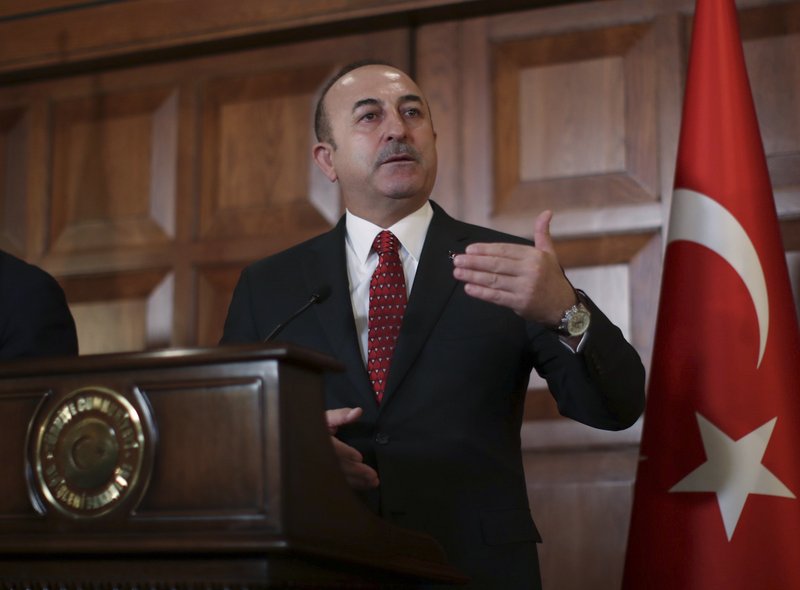RIYADH, Saudi Arabia -- U.S. Secretary of State Mike Pompeo said Monday that President Donald Trump's threat to devastate NATO ally Turkey's economy if it attacks U.S.-backed Kurdish fighters in Syria underscores America's commitment to its partners.
Pompeo said he had yet to speak with Turkish officials or Trump about the president's tweet and that he assumed Trump was referring to the imposition of sanctions should Turkey take military action against the Kurds in Syria, U.S. allies in the fight against the Islamic State group.
On Sunday, Trump tweeted that the U.S. will "attack again from existing nearby base if it [Islamic State] reforms. Will devastate Turkey economically if they hit Kurds."
Trump's decision to leave Syria, which he initially said would be rapid but later slowed down, shocked U.S. allies and angered the Syrian Kurds.
Pompeo said the U.S. message on the Kurds has been straightforward and unchanged since Trump made the decision to withdraw U.S. troops from Syria last month.
"The administration has been very consistent with respect to our requirement that the Turks not go after the Kurds in ways that are inappropriate," Pompeo said. "If they are terrorists, we're all about taking down extremists wherever we find them. I think the president's comments this morning are consistent with that."
Asked specifically about what Trump meant by devastating Turkey's economy, Pompeo replied: "We apply sanctions in many places around the world. I assume he's speaking about those kinds of things but you would have to ask him."
Trump's tweet drew a sharp response from Ankara and the Turkish lira lost some 0.84 percent of its value against the dollar on Monday after the U.S. president's threat.
President Recep Tayyip Erdogan's spokesman responded to Trump on Twitter by saying that Turkey "fights against terrorists, not Kurds" as a people. "Terrorists can't be your partners & allies," the spokesman, Ibrahim Kalin, said.
Turkish Foreign Minister Mevlut Cavusoglu also rebuked Trump, saying that strategic partners do not speak to each other through social media and stressing that Turkey is "not afraid of any threat. You cannot achieve anything with economic threats."
Pompeo said Trump's call for a 20-mile safe zone between Turkish forces and the Kurds was consistent with what the U.S. is trying to achieve in talks with the Turks. But, he said it remained a work in progress.
"We want to make sure that the folks who fought with us to take down the caliphate and ISIS have security and also that terrorists ... [in] Syria aren't able to attack Turkey, those are our twin aims," he told reporters in Riyadh after talks with Saudi officials.
For his part, Cavusoglu welcomed Trump's proposal for a 20-mile safe zone, saying Turkey had long advocated such a zone in northern Syria.
Later Monday, Pompeo pressed Saudi Arabia's crown prince on a range of issues -- including war, murder, diplomatic rifts and human rights abuses -- that have weakened the U.S.-Saudi alliance and increased tensions among Arab nations.
At the same time, Pompeo reaffirmed the two nations' shared goal of opposing Iranian policies in the Middle East.
"I want to talk to you about a couple of places we've been," Pompeo told Crown Prince Mohammed bin Salman, the de facto ruler of Saudi Arabia, at the start of their morning meeting at the royal palace. "We think we learned a lot along the way that will be important going forward."
Mohammed responded in kind.
"We'll try to add more positivity to your trip, as much as we can. And we'll try to cooperate more," he said.
The list included the killing by Saudi agents in October of Jamal Khashoggi, an outspoken Saudi dissident who lived in Virginia.
Pompeo said at the Monday news conference that both the prince and his father, King Salman, acknowledged in separate meetings at the palace that the Saudi government needed to show accountability for the killing. Yet Pompeo declined to answer a question about how his demands square with the CIA's conclusion that Mohammed was behind the assassination.
When pressed by a reporter about Mohammed's conduct, Pompeo ultimately said that Saudi Arabia's "leaders are going to act in their country's interests."
Information for this article was contributed by Matthew Lee and Suzan Fraser of The Associated Press and by Edward Wong of The New York Times.
A Section on 01/15/2019
